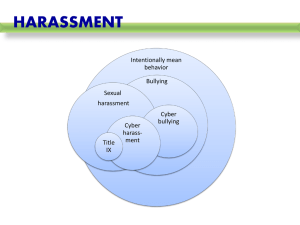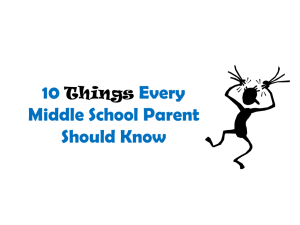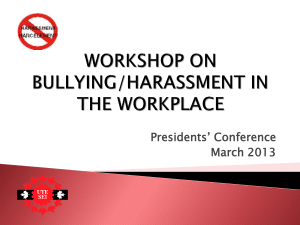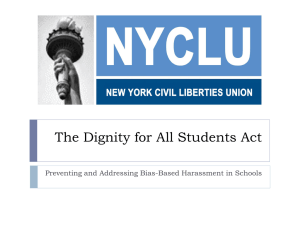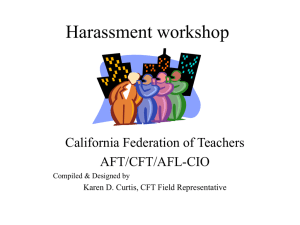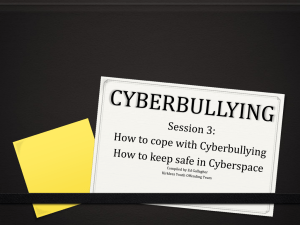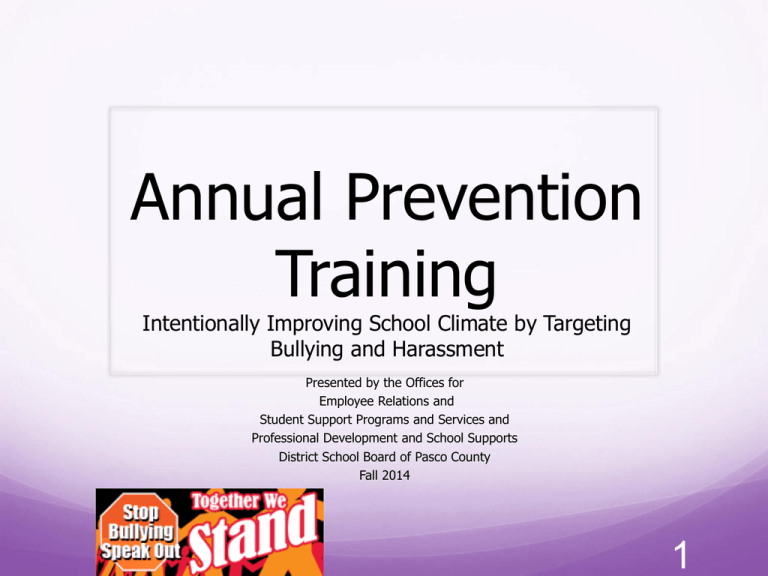
Annual Prevention
Training
Intentionally Improving School Climate by Targeting
Bullying and Harassment
Presented by the Offices for
Employee Relations and
Student Support Programs and Services and
Professional Development and School Supports
District School Board of Pasco County
Fall 2014
1
Why Focus on Preventing
Bullying and Harassment?
•
•
•
•
Short and long-term effects on students
Impact on bystanders
Improve school social climate
School staff are obligated to comply with
federal law, state statute, and Board policy
2
Why Focus on Preventing
Bullying and Harassment?
• Short and long-term effects on students
• Impact on bystanders
• Negative impact on hope, engagement, wellbeing
• School staff can be held legally liable if
demonstrating “deliberate indifference”
3
Our Commitment
The District School Board of Pasco County
does not tolerate bullying or harassment
which includes sex-based harassment
(gender, sexual orientation, gender
identity/expression).
The District is committed to taking
immediate action to eliminate bullying and
harassment, prevent its recurrence, and
reduce its effects.
4
Essential Questions
How do we define bullying and
harassment, including sex-based
harassment?
How will we implement the District’s
anti-bullying and harassment policy?
How can we foster safe learning
environments while enhancing and
supporting student achievement?
5
A Change in Perspective
Bullying is a behavior that can be
replaced or changed.
6
Overview of Bullying and
Harassment
7
Defined as systematically and chronically inflicting
physical hurt or psychological distress on one or
more students.
It is further defined as unwanted and repeated
written, verbal, or physical behavior, including any
threatening, insulting, or dehumanizing gesture,
that is severe or pervasive enough to create an
intimidating, hostile, or offensive educational
environment; cause discomfort or humiliation; is
carried out repeatedly and is often
characterized by an imbalance of power; or
unreasonably interferes with the individual’s
school performance or participation.
8
Bullying is…
Aggressive behavior that intends to cause
harm or distress. Bullying can be physical,
verbal, or emotional.
Usually repeated over time.
Most often in a relationship where there is an
imbalance of power or strength.
P.I.C.= Purposeful, Imbalance of Power,
Continual
9
Bullying is NOT…
Usually an isolated incident
Unintentional
A form of conflict with two parties of equal
status or power
Students may demonstrate undesired behaviors
that do not fulfill the definition of bullying, but
are nevertheless hurtful to peers. These
behaviors affect the school climate and
students’ well-being, and must be addressed.
10
Harassment is…
Any threatening, insulting, or dehumanizing
gesture, use of data or computer software,
or written, verbal, or physical conduct
directed against a student that places a
student in reasonable fear of harm to his
or her person or damage to his or her
property.
Harassment is usually based on a protected status
such as: race, color, sex or gender stereotypes,
religion, national origin, marital status, or age.
Harassment has…
the effect of substantially interfering with
a student’s educational performance,
opportunities, or benefits OR
the effect of substantially disrupting the
orderly operation of a school
12
Harassment is NOT…
Conflict in itself does not constitute
harassment, but could turn into
harassment if no steps are taken to
resolve the conflict.
Not all inappropriate comments/teasing
constitute harassment, but could turn
into bullying or harassment if no steps
are taken to resolve the issue.
13
Types of Bullying/Harassment
Verbal
Social or relational
Physical
Cyber
14
Cyberbullying
“The use of Internet, cellphones and related
technologies to hurt, harass or embarrass another
person in a deliberate, repeated and hostile
manner," including behaviors such as:
• Creating a false online identity to trick another
person into revealing information.
• Impersonating someone using a false social
networking page.
• Spreading lies and rumors about someone by text
message or over the Internet.
• Sending threatening or hurtful text messages.
• Posting online any embarrassing pictures of
people without their consent.
15
Recognizing
Bullying/Harassment
Physical signs like torn, damaged, or soiled
clothing; unexplained cuts, bruises, and
scratches; missing or damaged personal
items like books or homework without a
credible explanation
Social isolation
Truancy or frequent claims of physical
ailments in order to be allowed to go home
Declining school performance
16
Rough Play
Real Fighting
Bullying
Usually
friends;
often
repeated
(same
players)
Usually not
friends; typically
not repeated
Typically not
friends; generally
repeated
Power
relatively
equal
Power relatively
equal
Unequal power
No intent to
harm
Intentional harm
doing
Intentional harm
doing
Affect is
friendly;
positive,
mutual
Affect negative;
aggressive, tense,
hostile affect
Affect negative;
aggressive &
differs for victim
and aggressor
© The Olweus Bullying Prevention Group, 2004
Adapted from Teacher Handbook – pages 60-61.
BULLYING = PEER
ABUSE
18
Where Does Sexual
Orientation Fit In?
If students are harassed because of their
sexual orientation or gender identity, their
harassment is typically based on their
failure to conform to cultural gender
stereotypes.
This harassment IS sex-based
harassment and a violation of the
student’s civil rights.
19
Legal Issues and Liability
20
Jeffrey
Johnston
“Stand
Up for All
Students
Act”
1006.147,
F.S.
21
Jeffrey Johnston
“Stand Up for All Students Act”
1006.147, F.S
Prohibits bullying and harassment of any
student or employee of a public K-12
educational institution;
provides definitions of bullying and
harassment;
requires each school district to adopt a policy
prohibiting such bullying and harassment;
requires annual training for all employees;
22
Jeffrey Johnston
“Stand Up for All Students Act”
1006.147, F.S
Requires a procedure for reporting an act of bullying
or harassment, including provisions that permit a
person to anonymously report such an act;
requires a procedure for the prompt investigation of
a report of bullying or harassment and the persons
responsible for the investigation;
requires reporting to state DOE;
requires districts’ compliance to receive safe schools
funds.
23
Pasco County: Office for Civil
Rights Agreement
The District will take prompt and effective
responsive action reasonably designed to end,
prevent, and remedy any effects of a hostile
school environment.
School Board Policy regarding
bullying/harassment, including complaint
procedures, will be provided to parents,
students and employees
District staff will be trained on recognizing,
reporting and preventing bullying/harassment
Complaints of bullying/harassment will be
reported and monitored
24
Liability
The US District Court of Eastern Virginia
entered a judgment against the principal
who failed to believe a student’s complaint
of teacher abuse. She was ordered to pay
the student $350,000.
In Davis v Monroe County Board of Ed, the
Court announced that a school could be
found liable for monetary damages for
student-to-student harassment if the school
official had knowledge of the harassment,
the authority to correct it and did not act.
25
Liability
Gebser v Lago Vista Independent School
District expanded the definition of
“knowledge” to actual or what reasonably
should have been known by the school staff.
26
Deliberate Indifference
Deliberate indifference is the failure to act
or responding to bullying/harassment with a
strategy known to be ineffective.
A common misperception with parents and
others is that the school is liable for the
behavior of the harassing student – it is not.
The school is responsible for the RESPONSE
to the complaint.
27
Non-Discrimination
Statement
The District School Board of Pasco County
does not discriminate on the basis of race,
color, sex, religion, national origin, marital
status, disability, or age in its educational
programs, services, and activities.
For additional information or to report any
suspected violations of this policy please
contact Sandy May, Title IX
Coordinator/Equity Manager at (813) 7942679 or smay@pasco.k12.fl.us.
28
Impact of Bullying and
Harassment on Students
29
Students Who Bully/Harass
Tend to:
Have more positive attitudes toward
violence than peers
Be truant, drop out of school
Report poorer academic achievement
Perceive a negative climate at school
30
Bullying and Harassment
Affects the Total School Climate
• It interferes with student
learning
• It creates a climate of fear
and disrespect
• Students may perceive
lack of control/caring
31
Short-Term Effects
of Being Targeted
Lower self-esteem
Depression & anxiety
Absenteeism & reduced
academic achievement
Thoughts of suicide
Illness
© The Olweus Bullying Prevention Group, 2004
32
Effects on Bystanders
Bystanders may feel:
Afraid
Powerless to change the situation
Guilty for not acting
Diminished empathy for targets over time
Pressured to participate in bullying or harassing
behavior
© The Olweus Bullying Prevention Group, 2004
33
Student Code of Conduct
The District School Board of Pasco County does
not tolerate sex-based harassment.
Any student who believes he or she has been
subjected to sexual harassment, sexual assault,
gender-based harassment, or other sex-based
harassment should immediately report the
harassment to the District.
The District is committed to taking immediate
action to eliminate the harassment, prevent its
recurrence, and reduce its effects.
34
Student Code of Conduct
Students found to have engaged in acts of sexbased harassment will be subject to prompt
disciplinary action, including, if warranted,
suspension or expulsion.
Students, parents, and staff are encouraged to work
together to prevent sex-based harassment.
35
Reporting Requirements
36
Reporting Procedures
School personnel are legally mandated
to report all bullying and harassment to
the principal or designee
Anyone can report suspected bullying
or harassment
Florida law allows reports to be made
anonymously
Anonymous reports may be made via
the District web site,
http://www.pasco.k12.fl.us
37
Investigation
The principal or designee will investigate all
allegations of bullying or harassment to
determine if the report is substantiated
or unsubstantiated.
If an incident is not within the scope of the
school, the administrator will refer to the
appropriate jurisdiction.
Students who have been affected by
bullying or harassing behavior will be
referred for counseling services, as
appropriate.
38
Preventing and
Intervening in Bullying
and Harassment
39
What Is Our District Doing To
Address Bullying?
Awareness-raising efforts
Anonymous reporting via district web site
Professional development for all staff
Engagement surveys to identify strengths and needs
For all students: bullying prevention lessons,
opportunities for youth leadership, direct intervention in
bullying/harassment incidents, follow-up support
through Student Support Services
Implementation of district procedures for reporting
40
What Can Schools Do To
Address Bullying?
Tier I
Comprehensive approaches: school-wide efforts to
create positive school climate
Develop a positive school climate
Build a comprehensive web of support to increase
protective factors for all students
41
What Can Schools Do To
Address Bullying?
Tier II
Provide training/lessons for small groups of
students
Identify problem areas and times to increase
targeted supervision
Intentionally increase protective factors by
rewarding prosocial involvement
Avoid “group treatment” for students who
bully others
42
What Can Schools Do To
Address Bullying?
Tier III
Apply fair, consistent consequences
Individual work with students who have
bullied
Individual work with students who have been
targeted
Provide referrals to outside agencies
Mentoring
Do not require conflict resolution or peer
mediation for bullying situations
43
What Can I Do When I Witness
Bullying and Harassment?
On-the-Spot Bullying/Harassment Interventions
When you see behaviors happening:
Step 1: Stop the bullying/harassment.
Step 2: Support the target of the bullying/harassment.
Step 3: To the student(s) who bullied/harassed: Name
the behavior and refer to the rules of the Student
Code of Conduct.
Step 4: Empower the bystanders with appreciation if
they were supportive to the student who was
bullied/harassed or with information about how to
act in the future.
44
© The Olweus Bullying Prevention Group, 2004
What Can I Do When I Witness
Bullying and Harassment?
On-the-Spot Bullying/Harassment Interventions
When you see behaviors happening (con’t):
Step 5: Impose immediate and appropriate
consequences for the student(s) who
bullied/harassed.
Step 6: Take steps to make sure the student who
was bullied/harassed will be protected from
future targeting.
Step 7: Report the incident to the School Based
Administrator.
45
© The Olweus Bullying Prevention Group, 2004
**What Is Our School Doing
To Address Bullying and
Harassment?
Who is the administrator contact for
reporting?
Does our school use bullying reporting boxes,
or another anonymous procedure?
Who will be conducting investigations
(administrator)?
What form must be completed for reporting?
When do I report?
What do I do if a parent reports bullying to
me?
46
Academic Achievement and
Safe Schools
The ability of students to learn, teachers to
teach and all staff to work effectively is
directly related to the safety of our schools
and the health and well-being of our
students and staff.
Together,
we can create safe
environments to work,
teach and learn!
47
Our Commitment
The District School Board of Pasco
County does not tolerate bullying or
harassment which includes sex-based
harassment (gender, sexual orientation,
gender identity/expression).
The District is committed to taking
immediate action to eliminate bullying
and harassment, prevent its recurrence,
and reduce its effects.
48
Reflection
What is one thing you can
intentionally do as part of your
daily work to create a safe
environment for all students?
Thank You for Participating!
49

